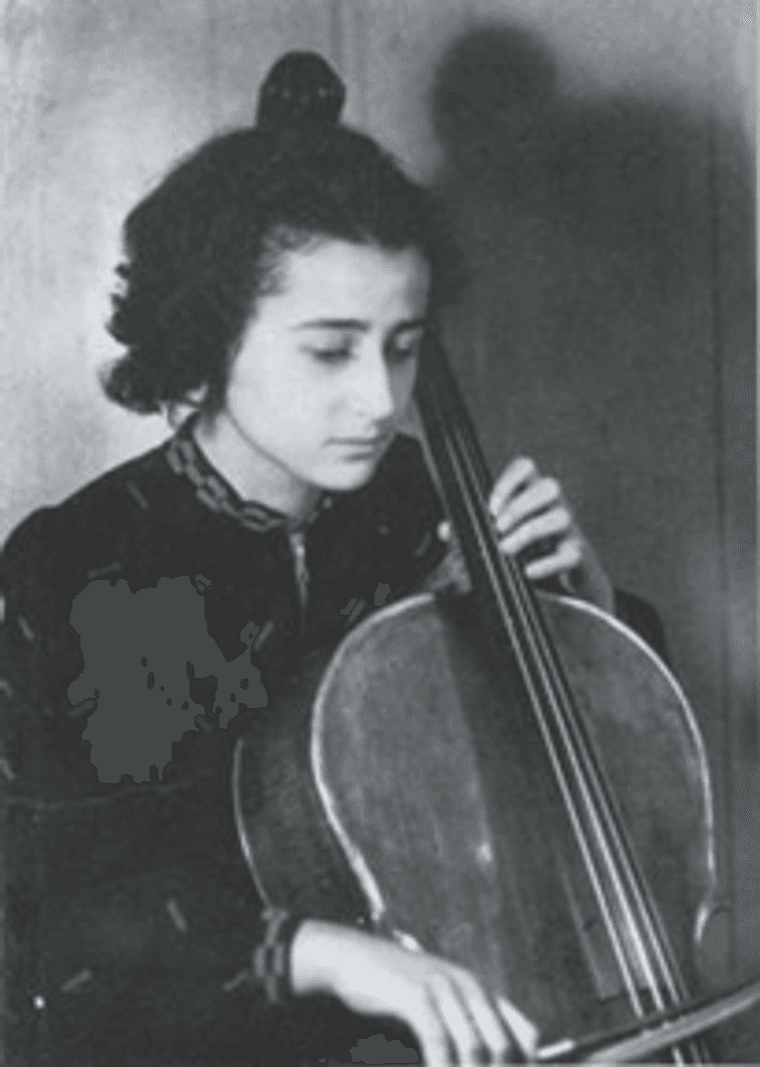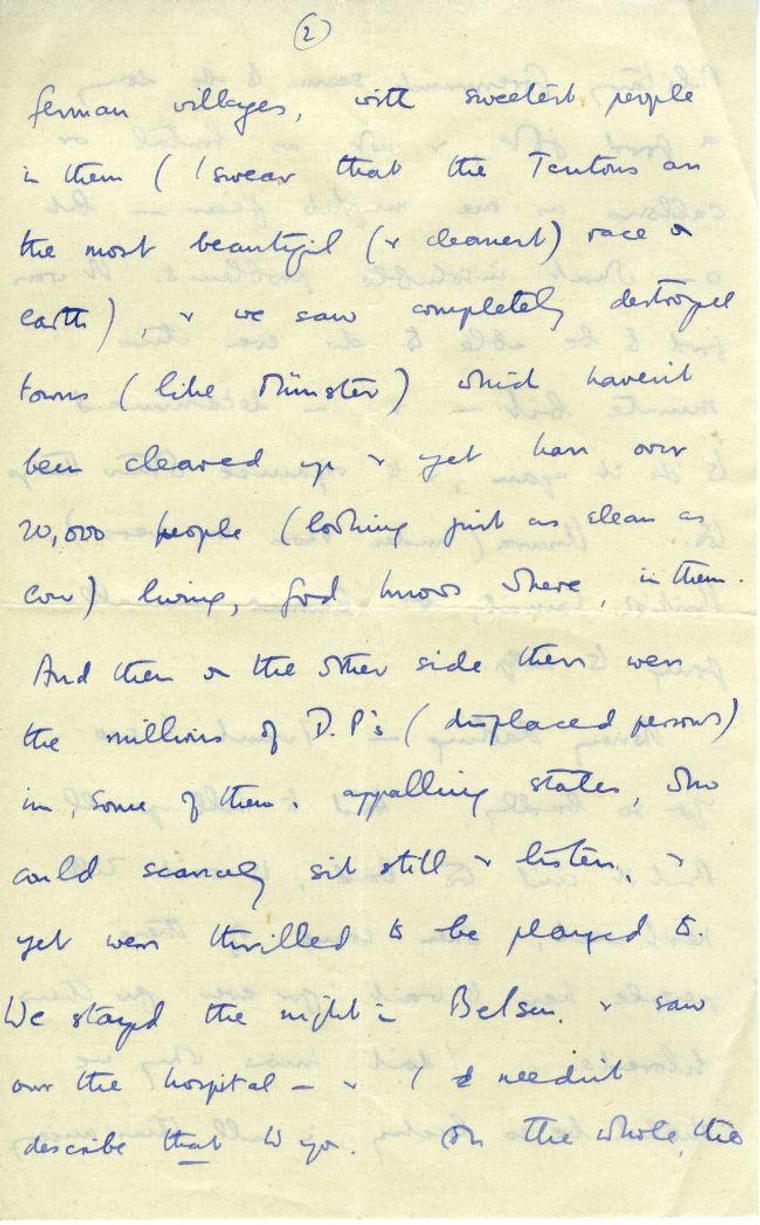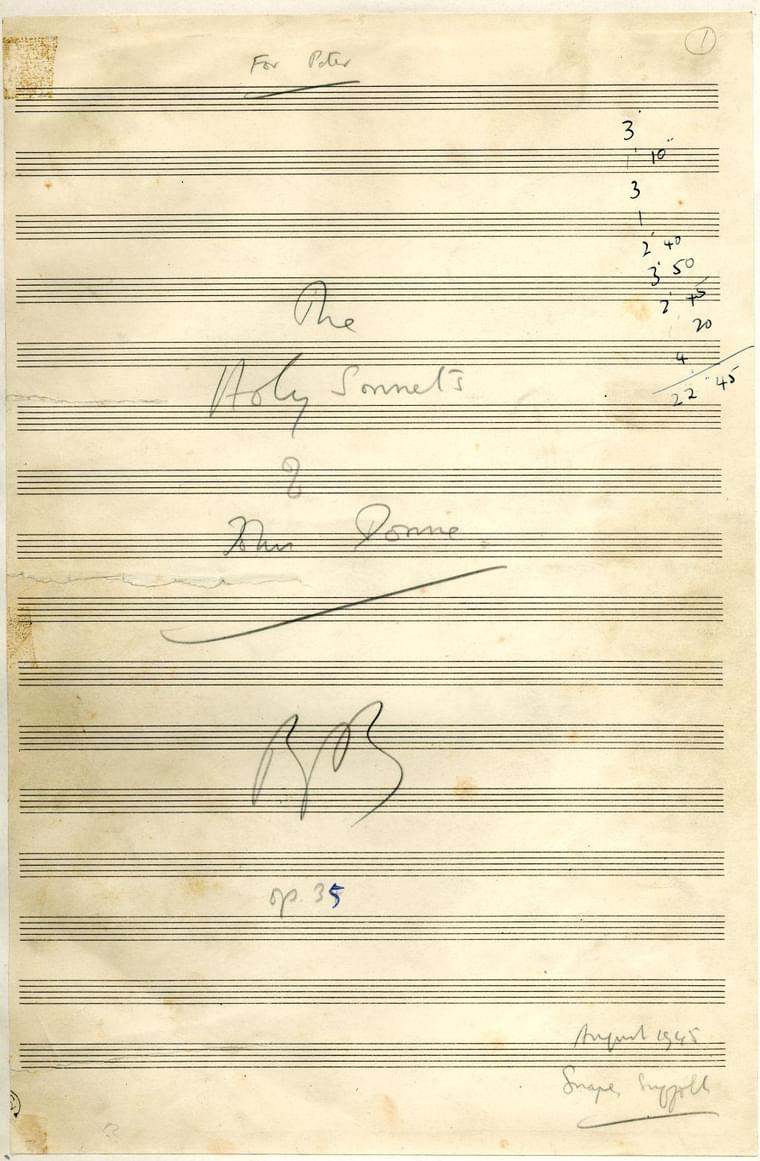We mark the 80th anniversary of the end of World War II, and of the liberation of the death camps with the story of a special concert tour and Britten’s connection with an extraordinary musician.
In early 1945 the allied forces began a process of liberation of prisoners held in Concentration Camps. Many of those who had survived the Holocaust, and were awaiting repatriation, were in a perilous state. Sick, malnourished, mentally wounded, they all bore the scars of an experience that would remain with them. Any possible alleviation to their suffering was offered, and it took various forms. In late July Britten and the violinist Yehudi Menuhin undertook a tour of the camps. Having met recently, Britten learned that pianist Gerald Moore was to have performed with Menuhin on this forthcoming tour, but his strong desire to go instead persuaded Moore to graciously stand aside.
Britten and Menuhin soon developed a strong working partnership. “He didn’t accompany me,” Menuhin observed, “I didn’t accompany him, we simply played as one, and we went through an enormous amount of the violinist’s repertoire – a great many sonatas and concerti and smaller pieces, which he did superbly of course.”
In an interview with film-maker Tony Palmer, Menuhin described his and Britten’s schedule and, inevitably, the impact of what they saw in the death camps they visited: “We simply threw ourselves into the job at hand and that was to play two, three and sometimes more times a day at these various camps, [for] displaced persons.” Upon arrival at Bergen-Belsen, which had been liberated by the British Army on the 15 April, they were struck by what the violinist recalled as the “most horrific impressions”:
I’m sure that Ben felt it as keenly as I did. We did not really speak a great deal about it. We were shattered by the presence of these people … for many this was the first concert, the first live music these people had heard in all those years. … They were wounded. They were traumatised. They didn’t believe any longer in anything. It could be good, it could be comforting and encouraging and music did open their hearts.
In the audience at Belsen was a young woman, a musician, Anita Lasker. She had been interned at Auschwitz-Birkenau in December 1943 and was transferred to Belsen in the final months of war as the allies progressed further into Germany. At Auschwitz she had been part of an orchestra assembled to play as fellow prisoners were taken away each morning to undertake camp labour and returned in the evening. The orchestra also had to perform for guards and officers. She was a cellist, and they were few in number in the camp, so this ensured her place in the orchestra and was, in turn, a contributing factor to her survival.
In the wake of liberation in 1945 the opportunity to hear music again offered some respite from the horror. Anita was excited by the prospect of hearing Menuhin perform. She recollected the concert in a letter to her cousin shortly after.
“My dearest H [Helli Schrier],
On Friday Yehudi Menuhin was here in Belsen Camp … It was a wonderful evening. Both soloist and accompanist were dressed in simple attire bordering on the slovenly, which matched the surroundings perfectly. … Menuhin played faultlessly, he is after all Yehudi Menuhin. But I must confess (and please don’t take this as an impertinence on my part) that I was a little disappointed. … I had the distinct impression that he was saving himself. …
As for his accompanist, I can only say that I cannot imagine anything done more beautifully. He was completely unobtrusive and yet I found myself transfixed by him sitting there as if he wouldn’t say boo to a goose – but playing to perfection.
Yes, who would ever have believed that Belsen Camp would hear Yehudi Menuhin playing? By the way, he played the Bach/Kreisler Prelude and Fugue, the Kreutser Sonata, Mendelssohn’s Concerto, something by Debussy and several smaller, unfamiliar items. ….”
Belsen Camp, 30 July 1945

Anita Lasker-Wallfisch
In his summary of the tour in a letter written to Pears Britten remarked on the travelling, the beauty of the countryside, the destroyed towns and the people separated from one another. There is the barest reference to the death camps. When he mentioned the concerts he wrote of “the millions of D.P’s (displaced persons) in, some of them, appalling states, who could scarcely sit still & listen, & yet were thrilled to be played to. We stayed the night at Belsen, & saw the hospital – & I needn’t describe that to you. … I don’t know why we should be so lucky, in all this misery.”

Excerpt from Britten’s letter to Pears describing his journey around Germany, 1 August 1945
In truth, Britten could not find the words to convey what he saw. Music, however, enabled expression. John Donne’s Divine Meditations or Holy Sonnets, a series of verses filled with concerns about the vulnerability of life and faith, voiced his thoughts on the worst that human cruelty had achieved. On his immediate return to Suffolk, between the 2 and 19 August, he set nine of Donne’s poems for high voice and piano accompaniment. Each song proclaims the danger of relinquishing belief in God’s mercy and trust, which the scenes at Belsen must have inspired. Significantly, though, these poems are not devoid of hope, and they acknowledge just as strongly the durability of the human spirit. Britten first performed The Holy Sonnets of John Donne on his 32nd birthday, with Pears as tenor soloist, at the Wigmore Hall on the 22 November 1945.

Title page of Britten’s August 1945 composition draft, The Holy Sonnets of John Donne, op. 35
The unforeseen attention Britten received from Anita during the concert at Belsen was something she would remind him of in later years. After leaving Germany she travelled to England. She married the pianist Peter Wallfisch, settled in London and raised two children. Resuming her career as a musician she became in 1948 a founding member of the Goldsbrough Orchestra which, 12 years later changed its name to the English Chamber Orchestra (ECO).
The ECO established a strong association with the Aldeburgh Festival from the early 1960s onward. Britten performed as piano soloist and conductor both on the concert platform and in the studio, recording works such as Bach’s Brandenberg Concertos and St John Passion. In 1967 the ECO was the first orchestra to perform at the new Snape Maltings Concert Hall after it was officially opened by Queen Elizabeth II. And Britten conducted the ECO in June 1970 when, a year after a fire that destroyed the Maltings, the Aldeburgh Festival opened with a concert to mark the rebuilding of the House. During the latter part of his career, Britten composed with the ECO’s sound very much in mind. The orchestra was involved in first performances of the operas Owen Wingrave (1971) and Death in Venice (1973), and the cantata Phaedra (1976) written for Janet Baker. Anita Lasker-Wallfisch took her place in the cello section on all these occasions.

Britten conducting a rehearsal for the opening of the Snape Maltings Concert Hall, June 1967. Anita Lasker-Wallfisch, 2nd cellist on right. Photograph: Hans Wild
The devastating fire that occurred on the opening night of the 1969 Festival was a lesson to Britten in overcoming adversity in more ways than one. The ECO was to have performed Mozart’s opera Idomeneo there the following day and, like everyone involved in that year’s Festival, they had to contend with hurriedly arranged alternative venues (Idomeneowas performed in Blythburgh Church).
A day or so earlier Anita loaned Britten the letter she sent to her cousin after the Belsen concert in 1945. It was written well before they were acquainted, and she wanted to give him what she regarded as a completely unbiased critique of his skill as a pianist. Britten was no doubt flattered and amused by Anita’s comments, and he was possibly astounded and humbled too by reference to him in a letter of such significance. He realised the value of this testimony of survival. The morning after the fire, amid the chaos and charred remains of the concert hall Britten saw Anita and said, “Anita, your letter is safe in my pocket.”
Anita Lasker-Wallfisch, cellist, Holocaust survivor, has devoted a considerable part of her life to bearing witness to the indefensible crimes she experienced, sharing with several generations her first-hand account of the death camps. At the time of writing, she is 99 years of age.
Excerpts from the interview and letter quoted in this article are taken from:
Werner Schmitt and Hendrik Feindt (eds.) Zeichen setzen / Taking a stand: Yehuhi Menuhin and Benjamin Britten in Bergen-Belsen. Bern: Muller & Schade, Musikverlag, 2018.
Anita Lasker-Wallfisch, Inherit the Truth 1939-1945: the documented experiences of a survivor of Auschwitz and Belsen. London: Giles de la Mare Publishers Limited, 2005.
Nicholas Clark, Librarian at The Red House.
